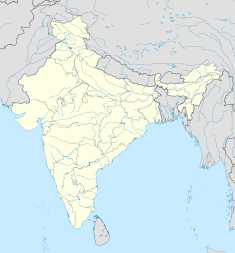Arikamedu
| Arikamedu | |
|---|---|
 | |
| Location | Pondicherry, India |
Arikamedu is an archaeological site near Pondicherry, southern India, where Mortimer Wheeler conducted his best-known excavation in the 1940s. Arikamedu - 'Arikan-medu or Poduke’ which literally means, ‘eroding mound’.[1] According to Wheeler, Arikamedu was a Tamil fishing village which was formerly a major Chola port dedicated to bead making and trading with Roman traders.[2] Various Roman artifacts, such as a large number of amphorae bearing the mark of Roman potter schools VIBII, CAMURI and ITTA, have been found at the site, supporting the view on an ancient trade between Rome and the ancient Tamil country of present day south India. Now Arikamedu is a part of Ariyankuppam Commune. Arikamedu was an important bead making centre.
Arikamedu is known to have been inhabited from pre first century times and was more or less continually occupied until modern times.[3]
See also
Gallery
-
Roman piece of pottery from Arezzo, Latium, found at Virampatnam, Arikamedu (1st century CE). Musee Guimet.
-
Grey pottery with engravings, Virampatnam, Arikamedu, 1st century CE.
Notes
- ^ "All roads here lead to Rome again". Indian Express. India. 06 November 2005.
{{cite news}}: Check date values in:|date=(help) - ^ "Rome mulling funding for Arikamedu project". The Hindu. India. 18 October 2004.
- ^ Upinder Singh (1 September 2008). A History of Ancient and Early Medieval India: From the Stone Age to the 12th Century. Pearson Education India. pp. 415–. ISBN 978-81-317-1120-0. Retrieved 14 September 2011.
References
- R.E. Mortimer Wheeler, My Archaeological Mission to India and Pakistan, Thames and Hudson, London, 1976. ISBN 0-500-05028-7
- "The Arikamedu Type 10 Project". Durham University. Retrieved 26 December 2011.
External links
- Excavations at Arikamedu
- Arikamedu on the website of Government of Pondicherry
- Exploration Off Arikamedu by Archaeological Survey of India
- Arikamedu Archaeological Site in India - A Brief Note by Discover India Site
- Poduke or Arikamedu the most ancient Tamil city
- Official site of Arikamedu Museum Gallery



